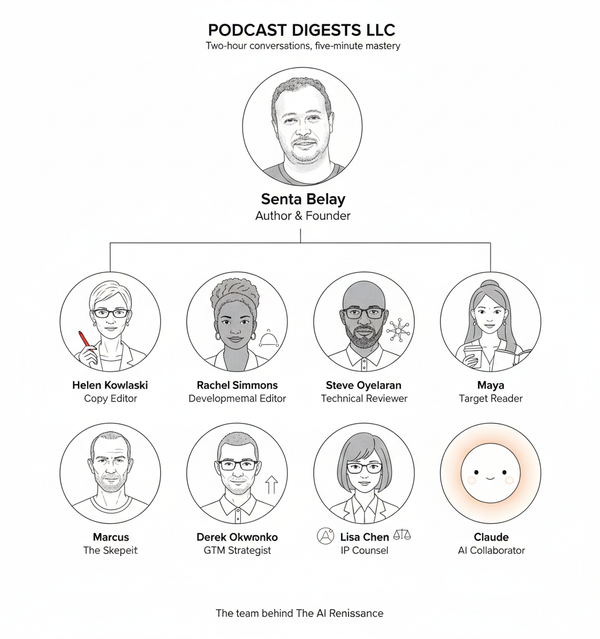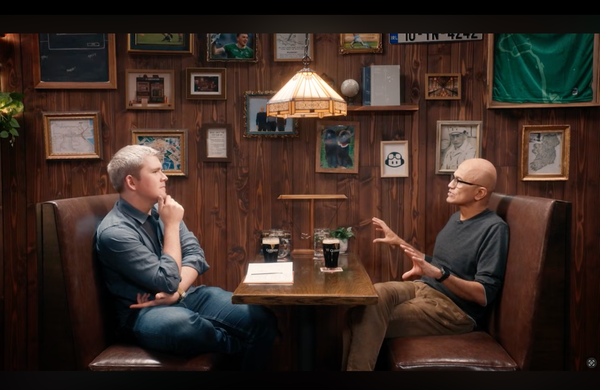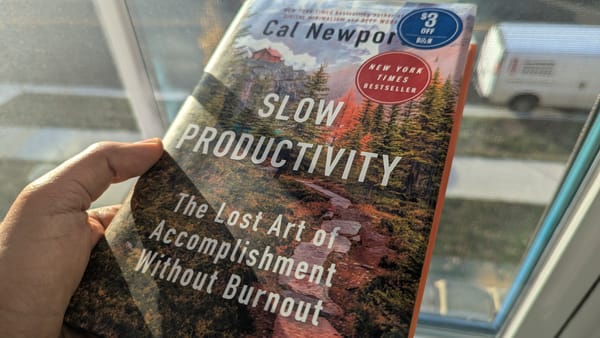Why Savers Are Losers: The Mathematics of Getting Poorer Safely
How Three Money Practitioners Exposed the Biggest Scam in Finance
Your bank account loses 10% yearly to inflation, Bitcoin crashes 70% but returns 145% annually, and dead people beat living investors. Welcome to the upside-down world where everything "safe" is killing you.
The modern saver, dutifully stuffing cash into a bank account like a good citizen, is committing the most predictable form of financial suicide known to man. Three practitioners (not theorists) sat down to dissect why everything you learned about money is wrong: a crypto maximalist, a financial educator, and an entrepreneur who actually owns things. Their diagnosis? The system is rigged through simple math that any fifth-grader could understand, yet most adults refuse to see it.
1. The Money Printing Scam: Your Savings Are Melting
Here's the theft nobody talks about. The government prints money at 8-12% yearly while your bank pays you 0.5%. This isn't complicated economics. It's basic math. Raoul Pal nails it: those "rising" stock prices? Your house "gaining value"? It's an illusion. The assets aren't going up; your money is becoming worthless.
The mug example is perfect. Give everyone at a table unlimited paper money, and suddenly a $10 mug sells for $150. The mug didn't change. The paper became trash. That's your savings account right now, losing value while you sleep, while you work, while you congratulate yourself on being "responsible."
2. Bitcoin: The Best and Worst Investment Ever Made
Bitcoin crashes 70% regularly and still returns 145% per year since 2012. It's simultaneously terrible and brilliant. The skeptics scream "Ponzi!" but miss the point: all money is just a story we agree to believe. Gold? Useless yellow metal. Dollars? Paper with dead presidents.
Here's what matters: 650 million people globally have crypto accounts. That's more than all stock market accounts combined. This isn't about technology. It's a massive vote against the banking system. When Pal says he's 100% in crypto, he's not crazy. He's betting against institutional incompetence, and the institutions keep proving him right.
3. Your Pension is a Lie Written by Dead People
Your retirement fund is a Ponzi scheme with government approval. Today's workers pay today's retirees while being told they're "saving for retirement." The brutal truth? When you retire, there won't be enough workers to pay you. The math stopped working when people stopped having babies.
The government's solution? Print money to pay you. Sure, you'll get your pension check. It just won't buy anything. Singh puts it perfectly: they'll pay you in currency that's worth nothing. Your "guaranteed retirement" becomes guaranteed poverty, just with extra paperwork.
4. Your House Isn't an Investment, It's an Expensive Liability
Buying a house to build wealth is like buying a treadmill to lose weight. Sounds good, rarely works. For the first 20 years of your 30-year mortgage, you're basically renting from the bank. They get rich on interest while you think you're "building equity."
Between property taxes, insurance (which doubles in hurricane zones), and those front-loaded interest payments, you're bleeding money. The three practitioners agree: your house is an expense pretending to be an investment. Rent, invest the difference, and stop subsidizing banker bonuses.
5. Your Network Is Worth More Than Your Portfolio
Harry Stebbings built a $750 million fund not through genius investing but through knowing the right people. Relationships create wealth; spreadsheets just track it. He sits with billionaires for two hours, and suddenly doors open that no amount of technical analysis could unlock.
The key? Give more than you take. That friend begging for £40,000 after ten years of silence? He's trying to withdraw from an account he never deposited into. Meanwhile, some kid named Divesh Makan sat in Silicon Valley coffee shops making friends with nerds when tech was "dead." Those nerds became billionaires. That's how wealth actually works.
6. Dead People Are Better Investors Than You
The best-performing investment accounts belong to dead people. Not a joke. Dead people can't panic-sell. They can't check their phones every five minutes. They can't make emotional decisions. They just sit there, compounding.
Dollar cost averaging works the same way. It removes your brain from the equation. When Bitcoin crashes 70%, your emotions scream "sell!" But the system keeps buying. By the time the market recovers, you've loaded up on cheap assets. Math beats feelings every time.
7. Bankruptcy: The Fast Track to Recovery
People who declare bankruptcy do better than those who don't. Sounds insane? Look at the data. Those who file recover faster and stronger than those who spend years bleeding out slowly. Why? Bankruptcy forces you to change the behavior that got you in trouble.
That friend of Bartlett's with £40,000 in credit card debt, desperately googling "passive income"? He's toast. Bankruptcy would force him to face reality. Instead, he'll spend the next decade dying slowly, too proud to admit defeat, paying interest on interest on interest.
8. Passive Income Is a Lie Sold to Suckers
"Passive income" is what broke people call their fantasies. Every millennial dreams of making money while sleeping. Reality check: it doesn't exist. Real estate isn't passive (ever dealt with tenants at 2 AM?). Dividend stocks aren't passive (someone manages that portfolio). Even crypto staking needs active management.
Singh learned this the hard way. His "passive" rental properties were anything but. The only passive income comes after a decade of extremely active work building systems. But that doesn't sell courses on YouTube, so nobody mentions it.
9. The UK: From Empire to Backwater in Two Decades
Britain went from running global finance to becoming economically irrelevant faster than you can say "Brexit." The country exports talent to America and imports regulations from Brussels. Then wonders why nothing works.
The death spiral is demographics. Old people don't build; they preserve. When your national strategy is "change nothing," you get what Britain has: polite decline with good museums. Spain has better weather and lower costs. America has actual opportunity. Britain has... nostalgia and expensive coffee.
10. Your Insurance Premium Is a Stupidity Tax
Bartlett sold insurance and reveals the scam: there's literally a slider that adjusts your rate based on how desperate you seem. Every company has this. They're betting you're too lazy to switch.
Yang calls every year to renegotiate. Most people would rather pay an extra $40 monthly forever than spend an hour on the phone. Insurance companies know this. They price your laziness into their profit margins. One phone call could save you hundreds. But you won't make it.
11. Stop Cutting Lattes, Start Making Money
The obsession with cutting expenses is middle-class cope. You can only cut spending to zero, but income has no limit.Yes, track your spending (most people have no clue what they spend), but recognize the game: wealth comes from earning, not from skipping Starbucks.
The hour you spend eliminating your $5 coffee could be spent learning something that adds $500 to your monthly income. But cutting feels safer than growing, which is why poor people stay poor.
12. The Population Bomb Nobody's Talking About
Every government budget assumes more workers tomorrow than today. Reality: nobody's having kids. The math is breaking. When population shrinks, you need either miracle productivity or infinite debt. Guess which one governments choose?
This is why they print money. Not conspiracy, just arithmetic. GDP needs population growth. No babies means no growth. No growth means print money or collapse. They choose printing. Your savings are the casualty.
13. CoastFIRE: Middle-Class Fantasy Math
Save $150,000 by 35, let it compound to $1.5 million by 65. Sounds great until reality shows up. This assumes no crashes, no currency crises, no black swans, and 8% returns forever. It's planning for a world that never existed.
The strategy isn't wrong; it's fragile. One crisis and you're 55 with half your expected savings and no backup plan. Real wealth building requires multiple income streams and flexibility. But that's scary, so people prefer their spreadsheet fantasies.
14. Why Rich People Get Better Loans Than You
At $10 million net worth, banks offer loans you don't have to pay back if things go wrong. Below that? You're personally liable forever. This isn't conspiracy. Rich people generate fees through activity. Poor people generate fees through penalties.
The system extracts maximum value from each person based on their ability to resist. It's not broken. It's working perfectly, just not for you.
15. AI: When All Economic Rules Break
By 2030, infinite AI agents doing infinite work breaks every economic model. What happens when machines create more value than humans? When algorithms invest better than any person? Nobody knows.
Pal calls it the "economic singularity." It's not science fiction; it's math. Infinite digital workers times infinite productivity equals... what? The old rules are ending. Betting on them continuing is the riskiest position of all.
Every "safe" choice is actually a guaranteed loss. Every "risky" choice at least gives you a chance. Your savings account isn't conservative; it's slow-motion suicide. Your pension is a promise from bankrupt governments. Your mortgage is just expensive rent with extra steps.
The dead investors beat the living ones because they can't make stupid decisions. They can't panic. They can't think. Sometimes, not thinking is the smartest thing you can do with money. The question is: will you keep believing comfortable lies, or will you accept uncomfortable truths? Choose wisely. Your future self is watching.



